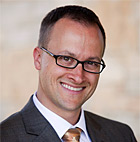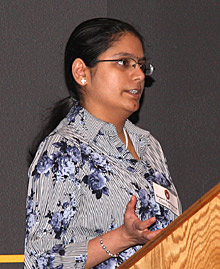Alumni Profile:
Biotechnology is the future—and I’m prepared for it.
Sridevi Kameswaran has been a pharmacist for more than a decade. During that time, she’s observed biotech pharmaceuticals gradually emerging on the market displacing the top 100 chemical-based drugs one at a time. Granted, biotech drugs currently represent five to ten percent of the pharmaceutical market and their higher cost occasionally prices them out of the market—but all of that is set to change, notes Kameswaran. “Biotechnology is the future—and I’m prepared for it.”
Understanding the science.
Pharmacists make a career out of adapting to change—continuously educating themselves on the latest advances in the pharmaceutical industry in order to best serve their patients. But there comes a point when, according to Kameswaran, “the leaflet accompanying the drug isn’t enough to really understand how it works.” Especially, she notes, in regards to biotech pharmaceuticals.
Kameswaran discovered the M.S. in Biotechnology program at the UW–Madison while at a pharmaceutical experimental station. “It combines the science and business of the pharmaceutical industry. You don’t have to pursue a separate MBA or science program because it’s all combined. That was very valuable.”
The two-year program provides a mix of courses covering intellectual property, science, business and legal issues relevant to the biotech pharmaceutical industry. Instructors range from university professors to regulatory professionals and CEO’s of independent and major pharmaceutical companies. Emphasis is placed on real world, hands on experience, not standalone theory. States Kameswaran, “The guest speakers and instructors all had their own experience to contribute. They gave very practical advice and answered all of our questions.” The program is also designed around a student’s career with the majority of students maintaining a full–time job while attending weekend courses.
Why did Kameswaran pursue an advanced degree? “I had primarily dealt with chemical-based drugs, but biotech is growing rapidly so I felt it was important to know how biotech drugs act. I wanted to understand how chemistry is different from biotech and I was fascinated with how biotech drugs work at a molecular level,” she states. Once enrolled in the program, her understanding of these complex new drugs was aided by the program’s hands-on lab courses. “I’d never worked in a biotech lab but in this program we weren’t just looking at photos of bacteria. I gained hands–on experience and it was amazing. I could indulge my curiosity and I’m a better pharmacist today because of it.”
Understanding the business.
The majority of students in the M.S. in Biotechnology program have decided strengths and weaknesses. They may be strong in marketing, but weak in science. Or, as Kameswaran freely acknowledges, they may be strong in science, but weak in business. The majority of students pursue the M.S. in Biotechnology because they feel career advancement and longevity hinges on understanding the biotech pharmaceutical industry from both a scientific and business perspective. In the ever-changing biotech realm, choosing which pharmaceuticals to develop and market requires a clear understanding of what the drug can and cannot do, and whether those capabilities and limitations are marketable to the public.
“I was purely a science person,” she admits. “The program’s business classes were very helpful to me. I’d never looked at pharma problems from a business point of view. I can now understand why a company does what they do and why they do it in the manner they do.”
Different perspectives lead to a better perspective.
A key component of the UW program is the diverse and carefully chosen cohort of students. Students work in groups to complete a variety of real–world classroom projects, with groups carefully chosen by instructors. “I liked that the instructors varied the groups and chose who you worked with,” explains Kameswaran. “You don’t get to just gravitate to those with a similar experience. They make sure you get a good mix of individuals so that you learn from those with different life and career experiences.”
“We learned a lot from each other,” states Kameswaran. “Cohort diversity was key because we had to work on projects together and those projects were always a combination of science and business. You have to focus on all sides of the issue—science, business and practicality—in these courses.”
She continues, “One of our tasks was determining whether a new drug should be developed. In order to ascertain that we needed to understand the market. Two of the students in my cohort had experience with the finance and business side of the pharmaceutical market and they offered priceless insights. I never would have looked at that project from their angle, but they opened my eyes. It’s nice to look at the same problem from different perspectives.” Adds Kameswaran, “Packaging was my forte and my experience and insights helped inform the other students. When you apply experience to projects it makes a big impact on your learning.”
Helping patients make the best choice.
How has the M.S. in Biotechnology impacted Kameswaran professionally? “At this point, when we get biotech products I know more about them than my colleagues. I understand how these medications act and their side effects. I can share this information with my colleagues and, quite honestly, they’re fascinated that I understand this. I don’t have to rely on a leaflet. I truly understand how the enzyme plays a role.” Ultimately, she notes, “This helps me better counsel my patients. I know what symptoms they need to report and I understand the importance of sticking to a regimen of biotech pharmaceuticals, which means I can better explain it to my patients.”
But it’s not just her understanding of biotech science that makes her a better pharmacist. “I see how the top drugs are being replaced by biotech. I understand how the products are going to get to market and how the science is being applied. And I’m able to better understand the cost aspect of it.”
“Can people afford biotech drugs?” she asks. “Right now, they make up the minority of the market and are more expensive. But that will change. I learned about the economies of scale in my classes—it’s a matter of manufacturers becoming more efficient in making the drugs. That will lower the cost and make them a better alternative for people.”
Until then, she notes, “I can appreciate where the market is and where it’s going and better advise my patients. If you stop taking a biotech therapy, there are adverse effects. If patients are going to stop taking the therapy because of costs, then I can advise better alternatives for them. I provide better service to people because of what I learned in the program. And I’m prepared for the future of biotechnology.”
This is an accordion element with a series of buttons that open and close related content panels.
Questions about the M.S. in Biotechnology Program?
Contact Bryan

“I specialize in helping prospective students understand the degree, how it fits their career goals and how to apply for admission.
Please contact me. You’ll receive a prompt response.”
Bryan Husk, Assistant Director
(608) 265-0773 office
bthusk@wisc.edu
LinkedIn Profile
About the M.S. in Biotechnology, UW-Madison
Established in 2002, the Master of Science in Biotechnology at UW-Madison is a two-year cross-disciplinary program for scientists, technical professionals, business strategists and attorneys seeking to advance their career in the biotechnology industry without having to put their career on hold.
The project-based curriculum focuses on the development and commercialization of new technologies and provides a diverse mix of science, business, bioethics, regulatory policy and patent law.
Students are instructed by world-renowned scholars and leading industry professionals in the biotechnology field. Graduates join a powerful professional network of over 350 alumni.

